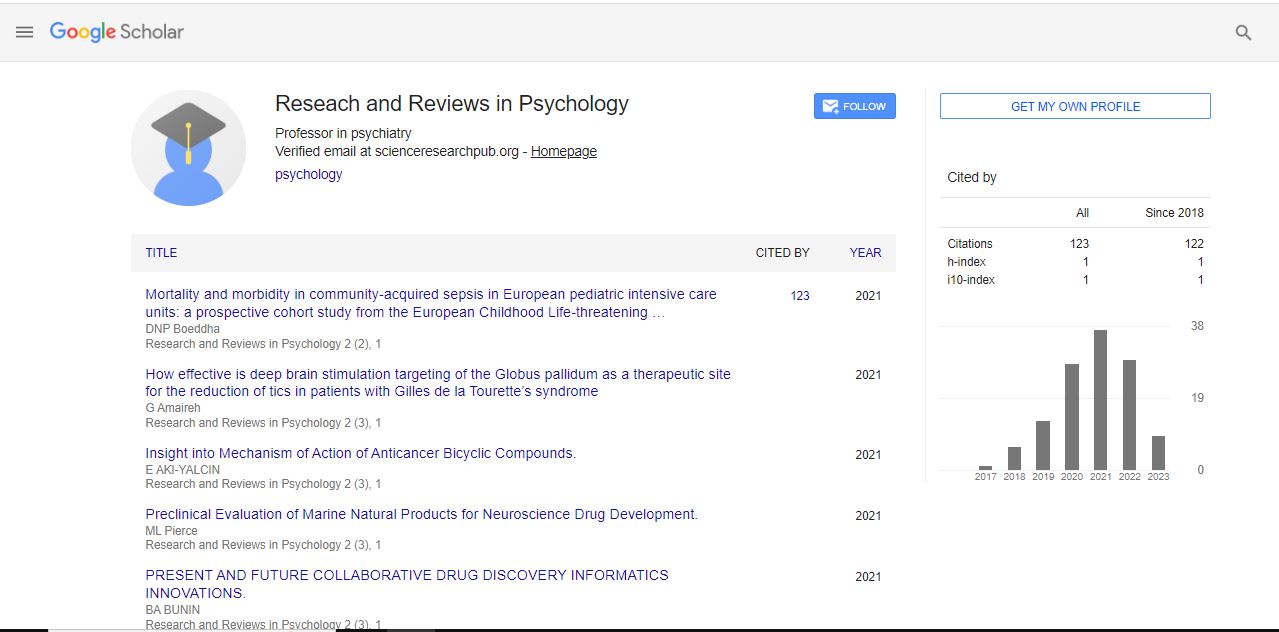Commentary, Res Rev Phys Vol: 4 Issue: 2
The Major Impact of Developmental Psychology: Its Implications and Applications
Yongjun Cao*
1Department of Psychology, Zhejiang University, Zhejiang, China
*Corresponding Author: Yongjun Cao,
Department of Psychology, Zhejiang
University, Zhejiang, China
E-mail: cao@yon.cn
Received date: 24 May, 2023, Manuscript No. RRPY-23-107406;
Editor assigned date: 26 May, 2023, PreQC No. RRPY-23-107406 (PQ);
Reviewed date: 09 June, 2023, QC No. RRPY-23-107406;
Revised date: 16 June, 2023, Manuscript No. RRPY-23-107406 (R);
Published date: 23 June, 2023 DOI: 10.4172/rrpy.1000338
Citation: Cao Y (2023) The Major Impact of Developmental Psychology: Its Implications and Applications. Res Rev Phys 4:2.
Description
Developmental psychology is a captivating field that delves into the intricacies of human growth and development across the lifespan. This study explores the fascinating realm of developmental psychology, focus on its core principles, research methods, and significant contributions to our understanding of the cognitive, social, emotional, and physical changes that shape individuals from infancy to adulthood.
Core principles of developmental psychology
Developmental psychology is guided by several core principles. It recognizes that development is a lifelong process that involves continuous interactions between nature (genetic factors) and nurture (environmental influences). The principle of multidimensionality emphasizes that development occurs across multiple domains, including cognitive, social, emotional, and physical aspects. Developmental psychologists also acknowledge the importance of individual differences and the influence of sociocultural contexts in shaping development. Additionally, the principle of plasticity highlights the potential for individuals to change and grow in response to experiences and interventions throughout the lifespan.
Research methods in developmental psychology
Developmental psychologists employ various research methods to investigate human development. Longitudinal studies track individuals over an extended period, providing insights into developmental changes over time. Cross-sectional studies compare different age groups at a specific point in time, allowing researchers to examine agerelated differences. Mixed methods research combines quantitative and qualitative approaches to gain a comprehensive understanding of development. Observational methods, such as naturalistic observation and structured observations, allow researchers to study behaviors in real-life or controlled settings. Developmental psychologists also use standardized assessments, interviews, and surveys to gather data on cognitive abilities, social interactions, and psychological functioning.
Significant contributions
Developmental psychology has made significant contributions to our understanding of human growth and development across the lifespan. It has focus on various aspects of development, including cognitive abilities, social development, emotional regulation, and the impact of early experiences. One important area of study is cognitive development, particularly the work of Jean Piaget. Piaget's theory of cognitive development posits that children progress through distinct stages of thinking, from sensorimotor to formal operational. This theory has provided a framework for understanding how children acquire knowledge, problem-solving skills, and reasoning abilities as they develop.
The study of social development has also been a key focus of developmental psychology. Researchers have explored attachment theory, which highlights the importance of early parent-child relationships in shaping socioemotional development. Understanding the dynamics of attachment has informed interventions aimed at promoting healthy social and emotional development in children. Developmental psychology has contributed to our understanding of the impact of early experiences on later outcomes.
Research on Adverse Childhood Experiences (ACEs) has revealed the long-term effects of trauma, neglect, and adverse environmental factors on physical and mental health outcomes in adulthood. This knowledge has led to the development of preventive measures and interventions aimed at mitigating the impact of early adversity. Furthermore, developmental psychology has provided insights into the development of moral reasoning and prosocial behavior. Researchers have examined how children develop a sense of right and wrong, empathy, and moral decision-making abilities. This research has implications for promoting moral development and fostering ethical behavior in individuals.
Implications and applications
Developmental psychology has important implications for various fields and applications. In education, it informs instructional practices and curriculum development, taking into account age-appropriate cognitive abilities and learning styles. Developmental psychology also informs parenting strategies, helping caregivers understand and support their child's development. The field has implications for clinical practice, as understanding typical development enables the identification of developmental delays or atypical patterns. Early intervention programs can be implemented to address developmental concerns and support optimal growth. Developmental psychology has implications for policymaking, particularly in areas related to child welfare, education, and public health. Research on early childhood development has influenced initiatives aimed at providing quality early education, parental support, and resources for healthy child development.
Conclusion
Developmental psychology unravels the mysteries of human growth, focus on the cognitive, social, emotional, and physical changes that shape individuals across the lifespan. Through research, developmental psychologists provide insights into the mechanisms of development, identify milestones, and understand the impact of early experiences on later outcomes. The field's significant contributions have implications for education, clinical practice, policy development, and promoting healthy development. As the field continues toadvance, our understanding of human growth will deepen, fostering a more informed and supportive environment for individuals to reach their full potential.
 Spanish
Spanish  Chinese
Chinese  Russian
Russian  German
German  French
French  Japanese
Japanese  Portuguese
Portuguese  Hindi
Hindi 